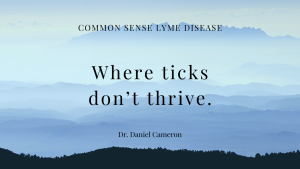Call for your appointment today 914-666-4665 | Mt. Kisco, New York

Physicians are warned of the importance in distinguishing between viral or idiopathic facial paralysis (e.g., Bell’s palsy) from Lyme disease-associated facial palsy. Authors of the study, “Steroid Use in Lyme Disease-Associated Facial Palsy Is Associated With Worse Long-Term Outcomes,” used the term Lyme disease-associated facial palsy (LDFP) rather than Bell’s palsy to highlight the differences in pathophysiologies between viral and idiopathic facial palsy.
LDFP was presumed to be the consequence of a humoral immune neuropathy rather than cell-mediated autoimmunity or edematous compressive neuropathy as seen with viral-induced Bell’s palsy. [1] “If LDFP is a humoral immune neuropathy, corticosteroid therapy may be ill-advised,” states Jowett and colleagues. [1]

The authors expressed concern that two-thirds of the 51 study participants had been prescribed corticosteroids.
“Because corticosteroids are the standard of care for acute viral facial paralysis, it is not surprising that they were prescribed to nearly all patients who were initially misdiagnosed as having such.” [1]
Other studies have described long-term treatment failures for Lyme disease (LD) patients following use of steroids. [2,3] Treatment failures were found in Lyme arthritic patients who were treated with intramuscular (IM) benzathine penicillin following steroids. [3]
In another study, two patients were ill for 3 years and one patient for 6 years despite receiving intravenous (IV) ceftriaxone. The authors explained, “Patients unresponsive to ceftriaxone were more likely to have received corticosteroid treatment.” Dattwyler et al. from Stony Brook Medical Center found an “association of steroid use with an increased failure rate or worsening of disease is understandable in view of the well-known effects of these agents on the inflammatory and immune responses.”
Dattwyler advised against the use of steroids in Lyme disease patients based on these two studies. “In view of the strong association between the use of steroids and the lack of response to antibiotic therapy, we believe that glucocorticoids should not be used in the treatment of Lyme borreliosis.” [2]
Treatment failures following steroids were also reported in a case series of recurrent Lyme disease by Cameron. [4] In the series, a 75-year-old man was prescribed diuretics for edema followed by steroid injections for a swollen knee. An 18-year-old woman with a 4″ x 4″ rash followed by pericarditis was treated with steroids instead of antibiotics. A 37-year-old man with disseminated early Lyme disease (LD) rashes and asthmatic bronchitis was treated initially with steroids instead of antibiotics.
Complications have also been reported in canine-infected Borrelia burgdorferi. [5] Dogs succumbed to arthritis after prednisone use. Straubinger found “corticosteroids inhibit the regulation of cytokines at the DNA level, thus handicapping leukocyte communication during treatment.” [6]
An association of steroid use with an increased failure rate or worsening of disease is understandable in view of the well-known effects of these agents on the inflammatory and immune responses. [2]
A study of Post-Treatment Lyme Disease Syndrome (PTLDS) supports concerns that the pathophysiology of LD is partly a consequence of a humoral immune response. The T-cell chemokine CCL19 remained high in 14% of Lyme disease patients despite a 3-week course of antibiotics. The level of the T-cell chemokine CCL19 for these patients was 12 times higher than for LD patients who were successfully treated with 3 weeks of antibiotics alone. [7]
“Individuals with ideally treated early Lyme disease have a greater than 12-fold higher risk of developing PTLDS by six or twelve months post-treatment if their CCL19 level is higher than 111.67 pg/ml at one month post-treatment,” writes Aucott and colleagues.
These studies remind us of the need to avoid steroids in patients who may have Lyme disease to avoid long-term treatment failure.
References:
- Jowett N, Gaudin RA, Banks CA, Hadlock TA. Steroid use in Lyme disease-associated facial palsy is associated with worse long-term outcomes. Laryngoscope, (2016).
- Dattwyler RJ, Halperin JJ, Volkman DJ, Luft BJ. Treatment of late Lyme borreliosis–randomised comparison of ceftriaxone and penicillin. Lancet, 1(8596), 1191-1194 (1988).
- Steere AC, Green J, Schoen RT et al. Successful parenteral penicillin therapy of established Lyme arthritis. N Engl J Med, 312(14), 869-874 (1985).
- Cameron DJ. Consequences of treatment delay in Lyme disease. J Eval Clin Pract, 13(3), 470-472 (2007).
- Straubinger RK, Straubinger AF, Summers BA, Jacobson RH. Status of Borrelia burgdorferi infection after antibiotic treatment and the effects of corticosteroids: An experimental study. J Infect Dis, 181(3), 1069-1081 (2000).
- Straubinger RK, Straubinger AF, Summers BA, Jacobson RH, Erb HN. Clinical manifestations, pathogenesis, and effect of antibiotic treatment on Lyme borreliosis in dogs. Wien Klin Wochenschr, 110(24), 874-881 (1998).
- Aucott JN, Soloski MJ, Rebman AW et al. CCL19 as a Chemokine Risk Factor for Post-Treatment Lyme Disease Syndrome: A Prospective Clinical Cohort Study. Clin Vaccine Immunol, (2016).




Here’s my comment.. everyone says no to steroids and Lyme disease.. so what does that mean?? Does it mean no to continual use and constant use of steroids… or no to not even one??? I have Lyme disease and co-infections and I have been suffering with severe lower back pain and three pinched nerves for over 2 months… I’m getting ready to go to one of the best Lyme clinics in the country but I cannot go with excruciating back pain… the clinic that I’m going to set it will be fine for me to have a shot in my lower lumbar… but everyone on the internet and everyone I talk to says no no no no… so what am I supposed to do go to a clinic for 4 months they cost $80,000… and not only suffer through treatment but also debilitating lower back pain.. with three pinched nerves and sciatica??? What’s the harm in one shot??? This Clinic says I’ll be fine because the first three weeks they will be boosting my immune system anyway… so can someone please give me an answer instead of this vague no to steroids.. I understand oral steroids can be bad and constant use of steroids can be bad but does that also apply to one shot??? A response would be nice thank you so much
Great question. I try to avoid steroids in my patients whether they have Lyme disease or not. I don’t like steroids but I don’t like pain. I have patients with severe enough pain where the benefits of a steroid injection is greater than the risk of steroids in Lyme disease. I keep my patients on antibiotics while being treated with a steroid shot. Of course, the risks are not so clear.
No. Don’t get the shot. No to all steroids. They will lower the immune system and cause worse pain and disease bacteria will spread.
I have Lyme. took prednisone for 3 days and got bad sick again. wish I never did. I told my dr I had horrible back pain so he gave me steroids. No one believed me that it was the prednisone because it don’t make you sick but with Lyme, yes. worse thing you can do I got bad headaches bloodshot eyes and alot eye pain.
Did you eventually get better?
What is the first thing they do when we start presenting symptoms for rashes/tendonitis/swollen knees/etc…they give us a shot of steroids for a quick fix to a bigger problem….that ends up costing us our health when it is all said and done? Or that was my case…no telling how many shots and packs of steroids I had during the time I was diagnosed with Fibro and CFS…it seems like a racket to make us sicker so they will make more money. Anyone that has any understanding of medicine should be able to go by symptoms…but, they don’t have time to listen…just shoot you up and walk out…knowing they will see us later 🙁
Dr.Cameron , my husband was initially treated with bactrim and prednisone for the rash that they thought could have been a staph infection. But it did not help at all so he followed up 2 days later where blood work was done but no change in meds. Still no better he followed up again 2 days later and they started him on doxycycline for lymes or other tick related illness and stopped the other 2 meds. 2 days into doxy and rash is starting to clear. He has had no other symptoms through all this. Lyme came back positive. My question is…should we be concerned that he had the prednisone? Also is 10 days sufficient duration for the doxy?
Doctors are divided on the duration. I prefer a longer course whether or not steroids were prescribed.
I am not a doctor but everything I have read in the Lyme community points to 6 to 8 weeks of Doxi, initially.
I often start with doxycycline. I sometimes add treatment for Babesia at the same time as Babesia is endemic and requires an additional treatment.
If someone feels better on prednisone, does that imply they don’t have lyme disease? My sister has been taking a course of prednisone for serious arthritic symptoms she has been having. The prednisone relieved her symptoms. Now that they are weaning her off the prednisone, her symptoms are coming back full force. Because of other issues she has (balance problems and glaucoma that resists treatment) I am concerned she has lyme disease. She says if she had lyme disease the prednisone would not have relieved her arthritis symptoms, (even if only initially). Is that true? Or could prednisone work initially but make lyme disease worse once it is stopped?
I find prednisone can help some Lyme disease patients some of the time as an anti-inflammatory drug. Steroids can give troubles on long term followup in some studies.
I am having extreme hair shedding — brillo pads a day, and burning of lips, skin, head,hands, hives, gastro… as mass cell activation…. what kinds Of medicines are options? Who should I see? I feel like I want to be in an ER. Im on fire. On IV doxy for anaplasma.
You have a lock of questions packed into your comments. Your doctor will have to look at the whole picture and may need to have specialists weight in.
Possible Addisons Disease for a person who has had Lyme for over 10 years. Family member going to be soon texted for Addisons Disease. If positive, I have read that hydrocortisone treatments are used, such as prednisone. I also am worried as steroids can create much worse issues for chronic Lyme patients. Are there other alternatives to help with this disease rather than steroid treatment? Thank you!
You would need to work with an endocrinologist. In this case, you may have to take enough steroids to correct the Addison’s disease while you are investigated for Lyme disease.
I was diagnosed with Lyme in August of 2019 after having had the symptoms, the bulls eye rash, and a negative test 9 mos. previous. My nurse practitioner said maybe it’s your atorvistatin causing the pain. Maybe it’s osteoporosis or rheumatoid arthritis. Maybe you should see a rheumatologist. Finally got the appt. 4 mos. later (10 mos. after seeing bite) and a positive Lyme test. She started me on 21 days doxy and methylprednisalone. Four days after finishing the 1st batch of doxy, symptoms re-appeared, mostly including joint and muscle pain. Doc put me on another 21 days of doxy. Did bloodwork each monthly follow-up visit, mostly testing for inflammation. Ended 2nd round of Doxy. Continued on methylprednisalone, incrementally reducing dosage every 4 wks. Now it’s 7 mos. later, still on 2 mg Methylpred. every other day, and pain symptoms have increased over the last 3 mos. To me it meant the steroid had only been masking the symptoms, making me less painful, but now all symptoms coming back again.
So today, Doc wants to put me on Methotrexate and 4 mg/day prednisone, then gradually reduce steroid totally. Yikes! The side effects of the Metho are very scary.
I’d just like to go off everything, except my atorvastatin and levothyroxine, and start from scratch with something safer for the Lyme issues.
What are your thoughts?
I am reluctant to prescribe steroids in a Lyme disease patient as it can suppress the immune system. You might consider consulting a doctor with experience treating Lyme disease.
Wow! Before coming back positive with Lyme borreliosis by an LLMD, my thyroid doctor thought that I was having adrenal problems and put me on hydrocort tabs. I started on just 5 mcg and was so very sick afterwards. I never felt better or had increased energy. I called the pharmacy and the dr and they were all very suprised and thought I was mistaken. They had me stop for a week and try again. Now I’m not feeling immediately ill from it, but still don’t have better symptoms. Now a few months later from my LLMD I have tested positive for Lyme borreliosis. I wonder if this is why I didn’t feel better from it?!
Steroids can make Lyme disease worse in my experience. Let me know if you have additional questions.
Dr. Cameron
In 2016 after coming off a 6 month regimen of steroids for oral lichen planus, I was told to just stop steroids abruptly. Shortly after I began to loose significant weight, had loss of appetite and difficulty walking. after much testing I was found to have Lyme borreliosis. Antibiotics didn’t seem to work. I was bitten by ticks as a child but don’t remember being symptomatic. Can steroids suppress immunity such that Lyme if dormant can become active and cause damage. It took years to diagnose Lyme and now it’s chronic and I still suffer with neurological problems, paresthesias, difficulty walking balance etc.
I have patients in my practice where steroids have made it more difficult to treat their tick borne infection. I have Lyme patients who who have done well even with steroids.
I have been dealing with Lyme disease for over 50 years, just diagnosed finally myself and had right testing 7 years ago. I just recently had cataract surgery in both eyes and for one month was put on daily use of imprimis Rx eye drops with a steroid, nsaid and antibiotic plus inactive ingredients (polysorbate 80 for one). I also seem very sensitive to most ingredients and chemicals. I just do not feel right on them. Should Lyme patients even be put on steroid eye drops. I still have 3 weeks to go in one eye, and 2 weeks to use in my other eye. Last year I also found out I have Babesia. Thank you for your response.
I avoid the use of steroids in my Lyme disease patients. On the other hand, there are times when there are no other choices. I typically look a second time as to whether Lyme disease underlies the illness, in this case your eyes.
Thank you for your reply. I do not believe that Lyme disease underlined my cataracts, but at the same time I do not like having to use these eye drops as I am not conformable using them being I am so sensitive to everything. But as my Lyme doctor stated, I do not want an eye infection or inflammation either. I will keep on using them until one month in each eye is over. Thank you again for responding. Mary V
Hi Dr. Cameron, On 12/7/20 I rec’d an epidural steroidal injection of methylprednisolone at L4/L5 in my lower left lumbar area in order to provide relief of what has been many years of on-again, off-again chronic low back pain. The procedure took less than 20 minutes in a pain management specialist Dr.’s office and was administered in conjunction with numbing medicine Lidocaine. (During the procedure, the Dr commented on how it was “tight” where he was trying to access so he was going “try from a different angle” and he completely withdrew the needle and went in at a different angle and thus successfully administered the 8 ml of medicine.) By the next afternoon I had EXTREME back pain in the region of the injection that made kidney stones (of which I have had many) seem like an absolute walk in the park. The pain was a 12 on a 1-10 scale. I was out of my mind in agony. Some background: I’m 62, male, in generally good health with no long term underlying health issues. On 7/12/20, I had a small tick on my lower right forearm that I removed without getting it tested and did not give it another thought. On 7/24/20, I fell ill with an incredible headache, full body ache, shivers, sweats, and fever. Thought I was gonna die and was certain I had COVID. COVID tested on 7/27/20 with results returned on 7/30/20 negative. Blood drawn the same day to test for tick-borne illnesses and immediately started on a 42-day regimen of twice daily 250mg Doxycycline tablets. Positive result for Lyme Disease on 8/3/20. Started to feel much better only days after starting the Doxy and after 42 days felt 100% and presumed I was 100% fine. On 9/21/20 and then on 10/5/20, the same back Dr performed a right-side, followed by a left-side, radio frequency ablation procedure in the L4/L5 area in hopes of providing back pain relief. After about 6 weeks I did not discern any noticeable relief. About mid October I started to notice that my joints tended to be achy and I often suffered from fatigue and was seemed to tire more readily during the day. Met with a Lyme Dr specialist on 11/24/20 and had blood drawn that was sent to two different labs: Quest and MDL (Medical Diagnostic Labs of NJ). Did not get test results until AFTER the epidural steroidal injection, unfortunately, and did not specifically mention to the back Dr prior to the back injection that I was likely still Lyme positive. (My bad!!) The pain from the shot got so intense by 12/10/20 that I spent 7 hours in the local ER getting injections of Toradol and morphine to relieve the pain and then got an MRI and a renal ultrasound to determine the nature of the pain. The U/S showed the 2mm kidney stone that I knew I had in the left kidney, but it had not ventured out into the the Ureter so it was ruled out. The MRI showed no hematoma nor infection that would suggest the cause of the pain, but it did reveal “some” inflammation. but ostensibly not enough to lead one to believe that that was the cause of the unbearable pain. My sense is that there are only 3 possible causes: 1. Just my dumb luck (my back Dr states that he has administered ‘thousands’ of these injections and can count on one hand the number of patients that had outcomes like mine), 2. The Dr. nicked something with the needle or some other way did something adverse to cause the pain (but that seems not to be borne out by the results of the MRI), and 3. there was a strong adverse reaction between the methylprednisolone and the underlying lyme disease that I have that caused something to go bonkers. (I slept on my couch in the family room for almost 4 weeks because I couldn’t really make it upstairs to the bedroom. I would say that I am now at about 80% if one assumes that 100% is the day before the injection and 0% is being in the ER out of my mind with pain. Dr. Cameron, can you provide any insight as to why you think I had this awful pain? Could it be a strong adverse reaction of the methylprednisolone with the lyme disease? I’m baffled and so is the back Dr. and so is the lyme disease specialist Dr, though they both seem to agree that there may be past evidence of bad interactions of the methyl with the lyme disease. Thank you, and I’m grateful for any insight you can provide. Mark H. 1/16/21
There are always more than one cause for your pain to consider. Lyme disease can affect the sensory system exaggerating pain. I am not sure how often steroids effects Lyme disease. You could also have a new bite that has not resolved.
I have Lyme disease chronic and also have had terrible sciatic pain for over 5 months. I thought it would eventually clear up but so far hasn’t. WHAT!!! CAN I DO TO GET RELIEF? Do not want steroid because of making lyme worse. Most doctors do not understand so I have just been suffering in silence so to say!! Cannot find a good Lyme doctor.
I have patients where their presumed sciatica was from sacroiliitis due to Lyme disease. In those cases treating Lyme disease and co-infections has been helpful.
I’ve not been diagnosed with Lyme disease (but I swear I have it). I can’t remember if the two occasions lined up, but I’ve received two steroid injections (a stronger one earlier this week) in my foot in the past 3 weeks (arthritis in addition to a toe surgery–and another fracture in the same toe!) and now I’m reading here and wondering if that has anything to do with my “Lyme” symptoms’ return.
I have some Lyme disease patients in my practice who have felt better during their steroid only get worse later. I suspect that the steroids led to a temporary effect on the immune system. I typically advise consulting a doctor with experience treating Lyme disease.
Dr. Cameron or anyone. I have not been diagnosed w Lyme, but I have CFS. I had horrible response to Prednisone. EXTREME fatigue, Mod Dizzyness and Mod nausea, could hardly walk. Happened every single time I took a pill within 10 Min and waned a bit before taking the next pill where cycle would start all over again with the severe symptoms above. Any answers as to why this would happen?? Detail, medical and physiological reasons, mechanisms would be appreciated. TY!
I have patients in my practice who find steroids helpful and others that do not. I advise my Lyme disease patients to avoid steroids if they can to avoid interfering with the body’s immune function. I find Lyme disease, COVID-19 long hauler, fibromyalgia and chronic fatigue look alike. I don’t think we know enough about the mechanism.
I’m a 74yo grandmother, diagnosed thru Igenex in 2019 and had bullseye rash. Met with Opthamologist today to discuss cataract surgery. He, like the 3 other Opthamologists I’ve seen know nothing about Lyme and say I’ll have to have steroids for the inflammation/swelling after surgery. I also have Macular Degeneration and am really concerned about the steroid drops they say are needed. Is there somethingelse they might use? Early on I took several different antibiotics for several months and then went on Dr. Rawls herbal supplements for last year and a half and have improved greatly; I don’t want to go backwards with steroids, but my eyesight is getting worse. Do you or perhaps a Lyme-literate opthamologist you might recommend, have an alternative to steroids? Thank you so much.
How long will lyme symptoms last after using steroids?? Cortisteroids triggered my chronic lyme and I’m now in agony. My Dr did mention this could be a side effect knowing full well i had chronic lyme. Will symptoms subside fairly quick after starting doxy and herbs? Its been 3wks since i was injected. How long do i have to live like this??
I have patients who quickly resolve a flare-up and some that do not. I have also had to change antibiotics in some of my patients.
I have patients who quickly resolve a flare-up and some that do not. I have also had to change antibiotics in some of my patients.
I live in Iowa, drs do not know about lyme. I have cronic lyme, arthritus and my back dr wants me to get steroid injections in my back, I heard steroids are a no no with lyme. What do I do? It is getting really hard to continue working and without llmd anywhere close, how do I continue? I need help or disability and I dont think either are posible
Find an herbalist that treats lyme or a practitioner that uses frequency or rife machines. Both can be life savers. You may need to do telehealth with an out of state practitioner. CA has some that do this. Wishing you a return to optimal health.
I have chronic lyme syndrome, I take steroids and it improves my bloodshot eyes fatigue and joint issues…never had an issue and I def have lyme.
In the past I have had a recurrence of Lyme disease brought on by epdiural steroid applicaton 3x for treatment of bulging disks which is now in remission. I have breast cancer and it is being recommended that I get 4 cycles of CheomTherapy – 20 Mg of Decadron (steroid) will be administered intravenously at the beginning of each cycle. Will a prophalactic medicine mitigate the recurrence of Lyme due to the steroid and the Chemo Therapy itself? If so how likely is it to mitigate? If so what is the recommended medication? Would be happy to have a tele-health appointment to discuss ASAP if warranted.
I have patients who have been ill with Lyme disease when they are diagnosed with a tick borne illness. I have had some Lyme disease patients who found out they also had cancer during their tick borne infection. I have treated these patients as they prepare for their cancer treatment. I have not administered prophylactic treatment for Lyme disease as they prepare for cancer treatment if their tick borne infection has resolved.
How do you know if your Lyme is cured?
Some patients remain well but are reluctant to used cured as there is always a chance there will be a recurrence. Some patients improve but have a difficult time resolving their illness.
If I was treated for Bells Palsy with prednisone before I was diagnosed with Lyme two weeks later, and I have subsequently gone through several rounds of oral and IV antibiotics without resolution of cognitive symptoms over the last 3 years, is there a high likelihood that I will just never feel better? I would love to stop spending thousands and thousands of dollars on treatment if it is ultimately pointless.
I took a steroid shot for my knee before I knew about lyme. I had a lot of neurological symptons cone back an d more. This was a big shot. I am all updet and feel I will never be well again. Anyone else see this or have kept unwell.
I have chronic lyme that was largely under control. Recently I was treated with a short course of prednisone for unrelated inflammation and within days started to get a recurrence of my chronic lyme disease symptoms back with intensity. I am now back on antibiotics. My question is what is the longer-term prognosis for someone who suffered a recurrence of elevated lyme disease from exposure to prednisone?
I have chronic lyme as well,, with random joints being involved,,, I do a plethora of alternative therapy, but the joint pain persists.. I tried a round of prednisone and felt NORMAL !!! But joint pain came back about 3 weeks later,,, now I would LOVE to get another short term round, but am fearful of a Bells palsy….